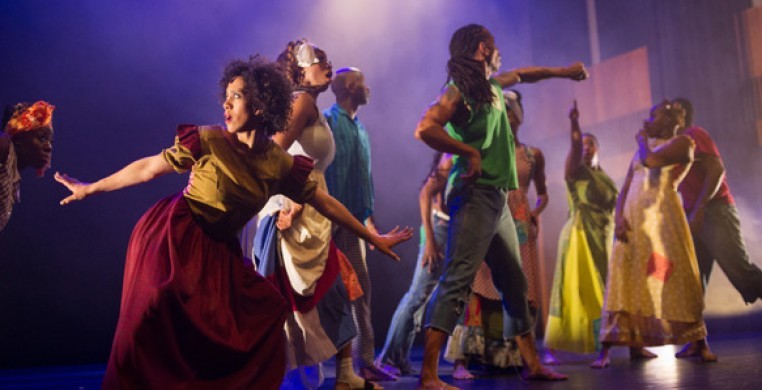February is nationally designated as Black History Month throughout the United States, but in Chicago, you don’t have to wait for February to experience the strength and vitality of African American culture on our dance stages. SeeChicagoDance spoke with several artistic directors of dance companies that are making a difference through their commitment to the expression of African American identity through dance in the diaspora.
Expression of identity and transmission of cultural values comes in all shapes and sizes, from authentic folkloric replications to permutations of tradition with amalgamations of modern idioms, each pursuing its goals in unique ways. African American dance in Chicago reflects diversity of expression across a spectrum of vibrant work, from the jazzy tap-dance energy of Bril Barrett’s M.A.D.D. RHYTHMS to the sublime contemporary concert dance of Deeply Rooted Dance, and Homer Bryant’s young troupe of classically-trained ballet dancers doing hip-hop and African dance forms en pointe; from Ayodele Drum and Dance in traditional African costumes and face paint, to the African-inspired dances of Muntu Dance Theatre. But it’s not enough to just be a company of African American dancers. On the other hand, many African American companies employ dancers of diverse races. The key is in the specifically African American heritage at the center of the work they do.
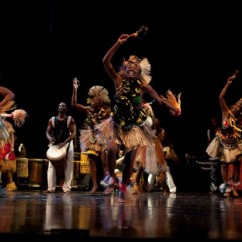 Muntu Dance Theatre
Muntu Dance Theatre
Muntu is the oldest continuously producing African American dance company in America, according to Joan Gray, president of the company. Its origins go back to 1972, when a group of drummers came together looking for a way to express the African American cultural heritage. But of course, no one can hold still listening to those infectious rhythms, and they soon added a dance component, initially calling themselves “Unifying Humanity Through Cultural Creativity” (UHTCC). Their goal was just that: harnessing the power of music and dance to bring people of diverse traditions, nationalities, races, and cultural backgrounds together in a mutually-inclusive celebration of life. Founding dancer and choreographer Alyo Tolbert favored “Muntu,” a Bantu language term for the same idea, as a company name that had a better chance of grabbing people’s attention. Muntu Dance Theatre of Chicago produced its first full-length concert at the Francis Parker School auditorium in 1975, a historically significant venue for dance in Chicago. (American modern dance pioneer Doris Humphrey made her debut there as well.) In the first years, Muntu was asked to perform regularly at community events such as weddings and funerals, solidifying its community-based objectives early on. The company founders saw a great need to educate Chicago’s African American community, as well as the population at large, about African American history and culture. “It’s a travesty that the story of how we came here is not taught in the schools,” says Gray, despite the state mandate to do so. “We get overly worked during Black History Month!” Muntu’s educational outreach programs have an especially critical impact in the inner city, where people know very little about their African and African American history and culture. “The more you know about yourself, and the more you love yourself, the more likely you are to love others,” Gray says. Muntu conducts dance and music classes at the Beverly Arts Center, with educational outreach programming in schools, community centers and group homes, reaching over 800 children a year. The 18-member company conducts open forms classes for adults as well, eliciting family stories from the community which they are compiling to use in their choreography. “How do we begin as a people to heal ourselves, and to forgive?” she asks. Muntu’s answer is in the work. New this year will be “Healing Hearts,” which will be a collaboration with a gospel choir. Catch Muntu at 10 AM on February 5 and 26 at the North Shore Center for the Performing Arts in Skokie; May 13th at 7:30 PM in the Chicago Rhythm Festival at the Auditorium Theatre; and July 18th for the Summer Concert and Gala at the Logan Center for the Arts in Hyde Park.
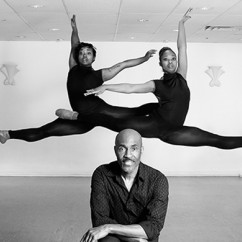 Homer Bryant. Photo by Preston Davis
Homer Bryant. Photo by Preston Davis
At the opposite end of the spectrum is The Chicago Multi-Cultural Dance Center, The School of Homer Bryant, at 47 West Polk, where 75 % of the 150 students are African American. Bryant, former principal dancer with Dance Theatre of Harlem, says African dance is part of the fabric, but classical ballet is at the heart of the training. Two of his more well-known students, Malia and Sasha, went on to the White House, but many of Bryant’s students go on to dance in professional companies in Chicago and nationally. “We are not only training dancers,” he says, “but making better human beings.” As with many of the artistic directors we spoke with, strong values are an important component of the training. While funding is always an issue for the not-for-profit school, Bryant never turns away a student, offering many scholarships. Community outreach includes weekly Friday workshops for 80 students from the Village Language Academy. The school’s housing in the basement of the former Dearborn Street Station is something of a challenge, but that doesn’t stop the school from turning out superbly-trained dancers. The Bryant Youth Professional Dance Company will perform with the Chicago Philharmonic at Navy Pier in March. Dance Center teacher and choreographer, Nina Rose Wardanian, in collaboration with Bryant, will premiere a ballet set to John Adams’ “The Chairman Dances.”
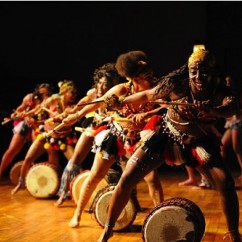 Ayodele Drum and Dance
Ayodele Drum and Dance
Ayoldele Drum and Dance, founded by former Muntu dancer, Tosha “Ayo” Alston in 2009, is “a diverse sister circle of performing artists committed to performing drum and dance as a healing element.” Ayo, who grew up in Brooklyn, NY, found African dance as a pre-teen after the death of her mother. It was dance that gave her a way to heal herself, and gain self-esteem, confidence, and strength. She has traveled to Guinea and Senegal as well as Brazil, studying authentic African dance forms and drumming. She sees drums, which traditionally only men were allowed to play, as a means to women’s self-empowerment. She has developed a curriculum for using dance and music to teach girls and women to build self-esteem, confidence, and a strong sense of identity. The dance curriculum supports positive moral practices of family support, loyalty, and commitment to community. Her ultimate message: women can do it all! Ayodele conducts classes at the Sherman Park District at 52nd and Racine. The company’s spring concert will take place on May 8-9 at the Logan Center for the Arts in Hyde Park, and will include “Herstory To Tell,” the stories of women of strength, in collaboration with Columbia College’s Onye Ozuzu, chairman of the Dance Department.
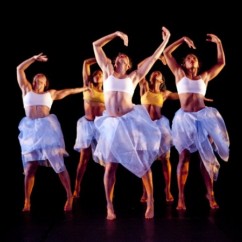 Urban Bushwomen
Urban Bushwomen
It’s not surprising that one of Ayo’s most influential mentors is Jawole Willa Jo Zollar, founding artistic director of New York-based Urban Bush Women. Zollar brings her company to The Dance Center of Columbia College March 19-21. Urban Bush Women brings the untold and undertold histories of disenfranchised people to light through dance. With a woman-centered perspective, and as members of the African Diaspora comunity, UBW seeks to create a more equitable balance of power in the dance world and beyond. The program will present three pieces, including Zollar’s newest work, “Hep Hep Sweet Sweet” a personal memoir of her family’s migration from Texas to Kansas City. Set in a fictional night club, the work draws upon the music and culture of the African American migration: south to north up the Mississippi River. Guest choreographer Nora Chipaumire’s dark swan interrogates and subverts how we present and represent African female bodies. Additional repertory will encapsulate the best of this extraordinary company's 30-year history. Zollar's work focuses on relevance in the times in which we’re living. At present, the most compelling issue she is addressing is “how to resist oppression and at the same time celebrate a sense of oneself and a liberated future.”
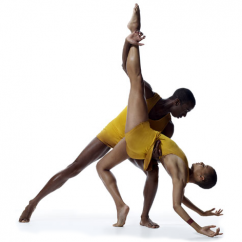 Deeply Rooted Dance Theater
Deeply Rooted Dance Theater
Deeply Rooted Dance Theater is a contemporary concert dance company committed to transmitting the African American aesthetic through dance. That aesthetic, says company founding artistic director Kevin Iega Jeff, “is connected to the diaspora and all the dance forms that have come to influence American art as it is experienced and seen through an African American vision of dance.” African American concert dance is rooted in the techniques that have been developed by artists before us, such as Katherine Dunham, Alvin Ailey, and Lester Horton, as well as by African dance forms, ballet, and modern dance, as long as they are “scientifically useful.” His artistic mission is “to examine ourselves socially,” and to personalize and define individuality. “With Black dance, that is extremely important,” Iega says, because for so long, dancers of color have had to prove and define themselves by the aesthetics and values of conventional Western theatrical traditions, exemplified by the European model for ballet companies, and not on their own terms. The goal is “to liberate our voices.” He sees dance as a uniquely powerful tool for that because it bares the human body to its essential truth. “To dance the aesthetic, you have to understand the history and culture, the spirituality that drives it.” This is true of any choreographic aesthetic, but especially so of African American dance. “I am most concerned about process,” Iega says, “ what dance is for the dancers we are training.” The essential question he asks them to answer for themselves is, “Who am I and how do I relate to this work?” Deeply Rooted is very much a part of the Chicago dance community, “but I’ve also had to liberate myself,” Iega says. “I began to lose my own values.” Instead, he wants to use dance to foster authentic conversations for artists and educators. “The work has got to inform the values and consciousness of the artists.” Deeply Rooted kicks off its spring season in May with its “Emerging Choreographers” showcase, preceding the summer intensive. This fall, Deeply Rooted will travel to South Africa to premiere its collaborative work with Durban’s Flatfoot Dance Company, which will be included in its December Chicago concerts.
For details of performances, go to Upcoming Events.
--Lynn Colburn Shapiro, editor

